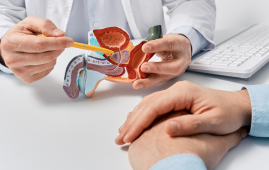

Diet and Hair Health: What Clinicians Need to Know
Hair loss, or alopecia, affects millions globally and can impact psychological well-being and self-esteem. While genetics and hormones have long been recognized as key contributors, emerging evidence highlights the role of diet and nutrition. A recent systematic review published in Nutrition and Health synthesized data from 17 studies encompassing over 61,000 participants to examine how dietary factors affect hair growth, density, and follicle health.
The analysis revealed that low vitamin D and iron levels are strongly associated with increased hair loss severity. Conversely, excessive intake of sugary drinks (>3500 ml/week) and alcohol may exacerbate hair thinning, particularly in men. Evidence also suggests that protein sufficiency, cruciferous vegetables, and certain supplements may support hair density and quality. These findings emphasize that specific nutrients and dietary patterns, rather than broad diets, can meaningfully influence hair follicle function.
“Current research underscores that nutrition is a modifiable factor that can help prevent and manage hair loss,” explained the study authors, highlighting the need for clinicians to consider dietary assessment as part of hair loss management.
Clinical Implications: Nutrition as a Preventive Strategy for Hair Loss
For HCPs, nutrition-focused interventions offer a practical avenue to support patients experiencing hair loss. Monitoring vitamin D and iron status, encouraging adequate protein intake, and limiting consumption of sugar-sweetened beverages and alcohol may help reduce the risk of alopecia and improve patient outcomes. Supplements such as marine protein complexes, persimmon leaf extract, and eggshell membrane demonstrated promising effects on hair density and gloss, though further trials are needed to confirm their efficacy.
The review also noted that certain dietary patterns, such as increased cruciferous vegetable consumption, may help maintain hair follicle integrity, while excessive vitamin A (retinol) intake may paradoxically worsen hair loss. Clinicians should assess both nutrient deficiencies and potential excesses when counseling patients.
Takeaway for Healthcare Providers
This comprehensive review reinforces the connection between diet, micronutrient status, and hair health. By integrating dietary counseling into patient care, healthcare providers can offer evidence-based strategies to prevent or mitigate hair loss. Given the psychosocial impact of alopecia, understanding the influence of nutrition allows for a holistic, patient-centered approach to hair health management.
For More Information:
Gomes, N., Silva, N., & Teixeira, B. (2025). Assessing the relationship between dietary factors and hair health: A systematic review. Nutrition and Health. DOI – 10.1177/02601060251367206, https://journals.sagepub.com/doi/10.1177/02601060251367206
more recommended stories
 Breast Cancer Prognosis Linked to High-Fat Diet
Breast Cancer Prognosis Linked to High-Fat DietKey Points A high-fat diet accelerated.
 Advanced Prostate Cancer and Serial ctDNA Analysis
Advanced Prostate Cancer and Serial ctDNA AnalysisKey Takeaways Serial liquid biopsies using.
 Tuberculosis Breakthrough with Experimental Antibiotics
Tuberculosis Breakthrough with Experimental AntibioticsKey Takeaways Experimental antibiotics disrupt a.
 National Healthy Longevity Trial Receives Federal Support
National Healthy Longevity Trial Receives Federal SupportKey Summary Up to $38 million.
 Vascular Health Linked to Early Alzheimer’s Brain Changes
Vascular Health Linked to Early Alzheimer’s Brain ChangesKey Takeaways Brain vascular health is.
 Red Blood Cells Improve Glucose Tolerance Under Hypoxia
Red Blood Cells Improve Glucose Tolerance Under HypoxiaKey Takeaways for Clinicians Chronic hypoxia.
 Pediatric Crohn’s Disease Microbial Signature Identified
Pediatric Crohn’s Disease Microbial Signature IdentifiedKey Points at a Glance NYU.
 High-Fat Diets Cause Damage to Metabolic Health
High-Fat Diets Cause Damage to Metabolic HealthKey Points Takeaways High-fat and ketogenic.
 Can Too Many Antioxidants Harm Future Offspring?
Can Too Many Antioxidants Harm Future Offspring?Key Takeaways High-dose antioxidant supplementation in.
 Human Antibody Drug Response Prediction Gets an Upgrade
Human Antibody Drug Response Prediction Gets an UpgradeKey Takeaways A new humanized antibody.

Leave a Comment